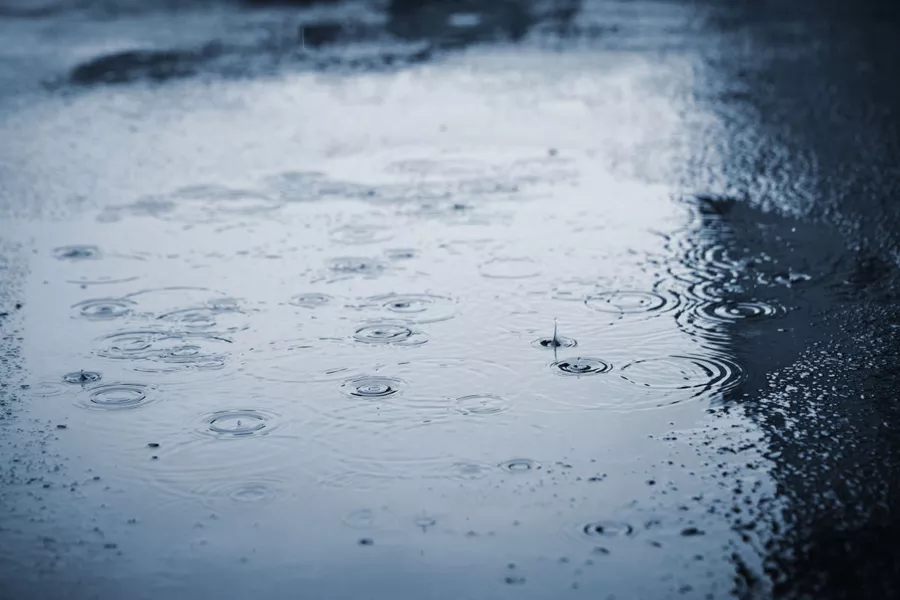Should I Cover My Outdoor AC Unit When It's Raining?

Wondering if your outdoor AC unit needs protection from rainfall?
No, you should not cover your outdoor AC unit when it’s raining. You may reach for the umbrella when the rain starts to fall, but your AC unit was designed to withstand most elements of nature. The exterior case of the unit will not break down or malfunction in any way when covered in the pouring rain. As long as the bolts holding it down are tight and secure, your unit won’t move under pressure from the intense wind.
While that may give you some peace of mind, there are still some potential rain-related complications for your outdoor AC unit. We’ll discuss the following points to help you navigate the rainy weather in Portland, OR, with less risk of urgent AC repairs:
- Why you shouldn’t cover your AC’s outdoor unit
- How to protect against flooding and debris
- How AC maintenance can keep your outdoor unit safe
Want honest advice on how to maintain your AC system?
If you’re tired of pushy technicians who never show up on time, contact Four Seasons’ friendly, NATE-certified professionals today at 503-538-1950. We’re here for reliable AC repairs and maintenance that you and your neighbors can trust, every time. We’ve served the Portland metro area for over 40 years, and we’ll gladly pass on our knowledge and experience to keep your AC in top-notch shape!
Why You Shouldn’t Cover Your AC’s Outdoor Unit

Keep at least 2 feet of clearance around your AC’s outdoor unit.
There are two main reasons you shouldn’t cover your outdoor AC unit:
- It’s unnecessary
- It increases your chances of needing AC repairs
Covering an outdoor unit is unnecessary because the units are designed to stand up to harsh weather. They’re made from durable materials that don’t break down easily and are sealed with strong coatings.
To that end, your AC’s sensitive components are protected inside the case. You may notice vents that make the outside unit appear vulnerable, but those vents are designed to ensure proper airflow around and through the system. When those vents are blocked, your system suffers from reduced airflow. This, in turn, can cause overheating and significant damage to components within the unit.
Now, you might be wondering, “What if I just put a cover on the outside unit during an intense thunderstorm? Good question– we get asked this a lot!
While temporary covers can provide peace of mind that your equipment is protected, the reduced airflow could encourage moisture to accumulate inside the unit. If you don’t remove the cover promptly after the storm, the moisture accumulation could damage parts internally.
Even if you cover your AC because you don’t intend to turn it on until next year, the cover may encourage animals to build nests inside the unit and can allow moisture to collect inside long term. It could even lead to rust, which can cause a host of problems and inefficiencies with your unit.
How to Protect Against Flooding and Debris

Standing water could damage your outdoor AC unit.
If you don’t want to cover your outdoor AC unit when it rains, what can you do to protect against flooding and debris? The best option is to take care of your house and the area of land surrounding the outdoor unit.
Start by installing and properly maintaining a leaf guard system to ensure your gutters do their job properly. Many AC units are placed near the gutter, if not directly underneath. If those gutters start overflowing because they’re clogged, debris may land directly on top of the AC unit. That increases the risk of debris falling into the unit and interfering with the motor, fan, and other system components.
Next, trim back any bushes, flowers, or trees growing close to the AC unit. Ideally, you will remove any plants within two feet of the unit. That reduces the risk of vegetation coming loose and flying into the AC unit during rainstorms that include a lot of wind.
To protect against AC repairs caused by flooding, make sure water doesn’t pool around the unit when it rains. You may need to improve drainage in the area if it does. While low standing water shouldn’t hurt the unit, higher flood waters can cause significant damage. It’s best to double-check the area after storms to ensure the water flows away from the unit.
Finally, don’t have empty trash cans, patio furniture, or other items close to the outdoor AC unit. These items can blow into the unit and block the vents, especially if you’re not home to notice and remove the items after the rain passes. The more debris you have flying around your property, the greater the risk of AC unit damage.
How AC Maintenance Can Keep Your Outdoor Unit Safe

You’ll enjoy higher comfort and reduced energy bills with routine HVAC maintenance.
Well-maintained systems can withstand stressful conditions better than neglected ones. When every component of your AC system is in proper working order, the overall system is stronger.
At Four Seasons Heating and Air Conditioning, we’re proud to provide one of the most thorough HVAC tune-ups in the Northwest. When you book service with our friendly NATE-certified technicians, they’ll make sure your AC or heat pump is fully-inspected, cleaned, and optimized for maximum performance.
This includes a full inspection of your outdoor unit and recommendations for protecting it from flooding, debris, and other rainstorm conditions.
Want to Schedule AC Maintenance with a 5-star Rated Company?
Call Four Seasons at 503-538-1950 today. We only employ highly-trained, honest technicians with the expertise needed to handle all your home’s AC maintenance and repair needs. Plus, we provide clear prices, convenient 2-hour scheduling windows, and back up our work with 100% satisfaction guaranteed.
